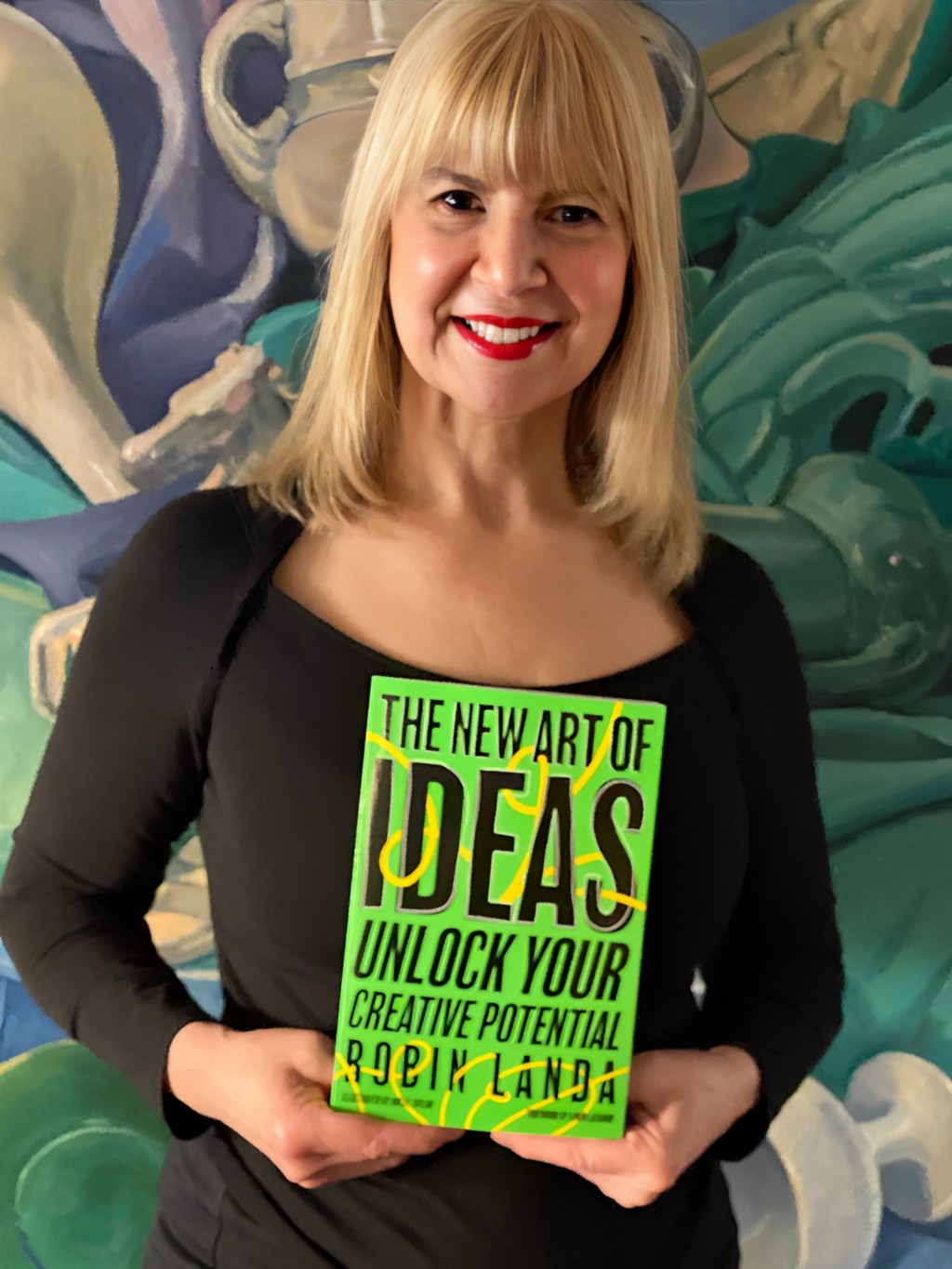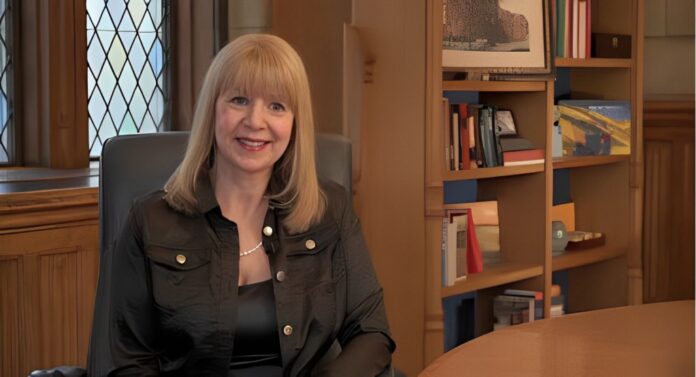The New Portrait Of Leadership: Robin Landa Of Kean University On Strategies to Shape Yourself Into A Modern Masterpiece
An Interview with Karen Mangia
People emphasize the importance of storytelling, which is critical to engaging communication, building organizations and brands. Story-listening is important, as well. The aim is to listen better.
We are living in the Renaissance of Work. Just like great artists know that an empty canvas can become anything, great leaders know that an entire organization — and the people inside it — can become anything, too. Master Artists and Mastering the Art of Leadership draw from the same source: creation. In this series, we’ll meet masters who are creating the future of work and painting a portrait of lasting leadership. As part of this series, we had the pleasure of interviewing Robin Landa, Distinguished Professor, Kean University.
Called a “creativity guru,” Robin Landa holds the title of distinguished professor at Kean University and is the author of 25 nonfiction books, including Strategic Creativity: A Business Field Guide to Advertising, Branding, and Design (Routledge, 2022) and The New Art of Ideas: Unlock Your Creative Potential (Berrett-Koehler, 2022).
Called “one of the great teachers of our time” by the Carnegie Foundation, Robin has held leadership positions in universities and other organizations. She has taught university students, as well as trained industry professionals, to generate lots of worthwhile ideas. It’s no surprise people consider her an expert in idea generation, but she’s more than that — Robin uses her creative powers for good.
She champions her university students, advocates for industry diversity, equity, and inclusion, and provides university scholarships. For her work advocating for human rights, she earned a Human Rights Educator award. She’s also earned recognition for her research, design, writing, teaching, and art, including awards from the National Society of Arts and Letters, ADCNJ, GDUSA, the National League of Pen Women, Teacher of the Year, NJ Author’s Award, and multiple Kean Presidential Excellence Awards for Research, among others.
For six years, Robin was a co-chair of Design Incubation, a design research organization; in that role she mentored faculty nationwide and now continues to do so through Writing Space. She has juried design and advertising competitions. Routledge will publish her forthcoming book, A Career is a Promise, and Columbia University Press will publish Shareworthy: Storytelling for Advertising, which she is co-authoring with Greg Braun.
When she is not working, you can find her dancing with her husband or watching Jeopardy with their daughter in her hometown of NYC.
Thank you for joining us. Our readers would enjoy discovering something interesting about you. What are you in the middle of right now that you’re excited about personally or professionally?
I’m writing A Career Is a Promise: Finding Purpose, Success, and Fulfillment, a new book about careers and leadership for Routledge, as well as co-authoring Shareworthy: Storytelling for Advertising with Greg Braun, retired deputy global chief creative officer, Commonwealth/McCann, for Columbia University Press.
I am still on tour giving presentations about my latest books, The New Art of Ideas: Unlock Your Creative Potential and Strategic Creativity: A Business Field Guide to Advertising, Branding, and Design.
We all get by with a little help from our friends. Who is the leader that has influenced you the most, and how?
Dr. Lamont Repollet, the 18th President of Kean University, is a transformational leader. Whether fostering equity through multiple educational initiatives, encouraging the wellness of the university community, or providing new research opportunities for students and faculty, President Repollet leads with grace, compassion, insight, and vision. He reminds me of other great leaders I admire for solving critical issues and for what they’ve contributed to education, for example, Luis Von Ahn, Duolingo, and Sal Khan, Khan Academy.
Sometimes our biggest mistakes lead to our biggest discoveries. What’s the biggest mistake you’ve made as a leader, and what did you discover as a result?
A large organization’s culture is not easily deconstructed due to its inherent complexity and hierarchy of leadership. Not fully considering an organization’s culture is always a mistake. When I was first hired at one organization, I was so thrilled with my role, the potential for growth, and (what I thought were) the possibilities for change that I hadn’t realized just how entrenched the organization’s culture was and how it would take no less than a complete cultural overhaul to bring about positive change. Never underestimate entrenchment, which is an impediment to growth and new worthwhile ideas.
Carry out due diligence as best as you can before joining an organization to assess whether you will flourish and be able to affect change.
How has your definition of leadership changed or evolved over time? What does it mean to be a leader now?
In the past, leaders have been beholden to their external stakeholders, concerned about earnings only. Leaders now must think about the impact of all decisions and actions on people, the planet, as well as profit.
Success is as often as much about what we stop as what we start. What is one legacy leadership behavior you stopped because you discovered it was no longer valuable or relevant?
Of course, a leader must have insight and vision, however it’s critical for them to get everyone working towards a shared vision and goals, often crafting a vision collectively. That way, you obtain others’ insights and ideas; and, then it’s more likely that everyone enthusiastically strives towards the same goals and objectives.
What is one lasting leadership behavior you started or are cultivating because you believe it is valuable or relevant?
I lead with compassion. By obtaining multiple perspectives, I try to ascertain and understand others’ points of view and circumstances in context.
Any discussion is not necessarily about the organizational mission but about how any individual is thriving and feels the leader values their ideas and contributions.
What advice would you offer to other leaders who are stuck in past playbooks and patterns and may be having a hard time letting go of what made them successful in the past?
Think without a playbook. Times are too dynamic for anything other than nimble thinking where you anticipate the future, problem find, and can pivot easily. I learned this from PJ Pereira, creative chairman and co-founder of Pereira O’Dell.
When the Advertising Club of New York and The International ANDY Awards announced PJ Pereira as Jury Chairman, Pereira and the AD Club and ANDYs launched their multi-prong initiative to accelerate the growth of new leaders, including “Face The Future,” an initiative to propel a new generation of diverse leaders for the industry.
Many of our readers can relate to the challenge of leading people for the first time. What advice would you offer to new and emerging leaders?
Put people first, which goes back to leading with compassion. Any organization is a construct however each employee is a thinking and sentient individual with ideas, an essence, and rights.
Based on your experience or research, what are the top five traits effective leaders exemplify now? Please share a story or an example for each.
· Someone who creates and fosters an equitable environment where everyone has multiple opportunities to generate ideas, create, and contribute.
Sophie Gold, executive producer and founder of Eleanor, created the only Black, certified female-owned commercial production company in the U.S.; Gold ardently advocates for diversity within the industry so that Eleanor’s solo position within it will become one of many.
· Effective leaders take action. They don’t just talk.
Bernice Chao, who is the head of integrated creative at Zambezi, and is an author, speaker, professor, podcast host, co-founded the non-profit Asians in Advertising. She is one of the few female Asian American creative leaders in the industry and works at North America’s largest female-owned advertising agency.
Chao gives back to the world by fighting against xenophobia toward Asian Americans and inspiring the next generation of talent through mentorship and scholarship programs.
· Emotionally intelligent leaders, such Dr. Repollet, treat everyone with respect and make everyone feel counted.
Before Dr. Repollet was the president of Kean University, he was the commissioner of education for the state of New Jersey and a member of Kean University’s board of trustees. When I presented a student initiative that received international attention to the board, Dr. Repollet came up to me afterward, shook my hand, and congratulated me. His gesture imprinted on me. Beyond being a brilliant leader, Dr. Repollet is a mensch, a Yiddish word meaning a “person of great character.”
Similarly, Rob Reilly, global chief creative officer of WPP, takes the time to praise individuals and agencies on LinkedIn and social media platforms. Rob even took the time to post a wonderful endorsement of my book, Strategic Creativity. And when Reilly was global creative chairman at McCann Worldgroup, he came down to the career fair held at McCann’s New York headquarters to chat with my students and wish them well — another mensch.
If all leaders were as generous as Repollet and Reilly, many more people would feel supported and valued.
· Speaking of people of great character, leaders should be counted on to act with integrity and commit to diversity, equity, and inclusion (DEI). Ensuring a diverse and inclusive organization, offering equitable opportunities, and creating a safe space for everyone to speak up and be heard is important as well as taking up advocacy. Leaders should set and meet DEI goals.
Dr. Repollet created the Equity in Action Presidential Postdoctoral Fellowship Program, to take action to promote equity, expanding access to those historically excluded from the academy, and promoting a sense of belonging for all.
· People emphasize the importance of storytelling, which is critical to engaging communication, building organizations and brands. Story-listening is important, as well. The aim is to listen better.
When Dr. David S. Birdsell became Kean University’s new Provost and Senior Vice President for Academic Affairs (which is the chief academic officer of a university), he carefully listened to what the faculty and deans said and continues to do so. As a veteran higher education leader and esteemed political communication scholar, Dr. Birdsell understands how critical it is to establish communication-centered leadership. A great leader leads and also listens mindfully.

American Basketball Coach John Wooden said, “Make each day your masterpiece.” How do you embody that quote? We welcome a story or example.
That’s a tall order. In the arts, a “masterpiece” is an artist’s greatest achievement or one of their greatest. I prefer to think of doing my personal best every day, which is not always possible due to unforeseeable circumstances or interference. Yet, every day I strive to live in the moment aiming for my personal best and squeezing the most juice out of a day’s work.
What is the legacy you aspire to leave as a leader?
I hope I’ve helped as many others as possible to achieve their goals and lead with compassion.
How can our readers connect with you to continue the conversation?
Thanks for this opportunity! Best wishes to all of your readers.
https://www.linkedin.com/in/robinlanda/
https://www.instagram.com/proflanda/
Thank you for a meaningful conversation. We wish you continued success with your mission.
About The Interviewer: Karen Mangia is one of the most sought-after keynote speakers in the world, sharing her thought leadership with over 10,000 organizations during the course of her career. As Vice President of Customer and Market Insights at Salesforce, she helps individuals and organizations define, design and deliver the future. Discover her proven strategies to access your own success in her fourth book Success from Anywhere and by connecting with her on LinkedIn and Twitter.
The New Portrait Of Leadership: Robin Landa Of Kean University On Strategies to Shape Yourself Into… was originally published in Authority Magazine on Medium, where people are continuing the conversation by highlighting and responding to this story.


